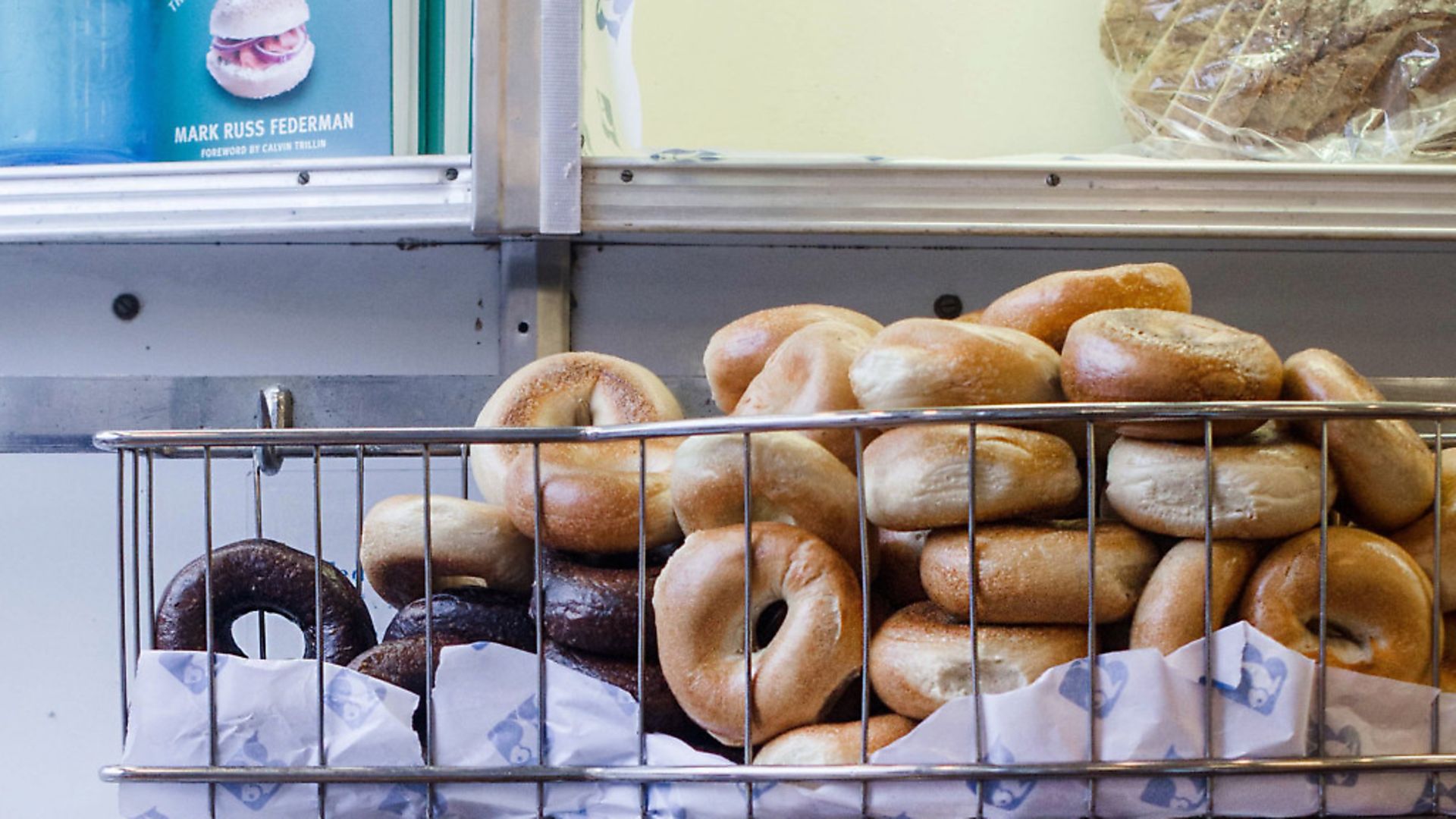
A culinary icon of Jewish delis, there are more bagel bakers in London than you may think – we track down where to find a proper bagel in the capital
Lots of people are talking about bagels at the moment. Not those pale, stale things you get in the supermarket – real bagels, where the spongy dough has been boiled before baked. Perhaps they’re topped with sesame seeds and filled with smoked salmon; maybe they’re studded with raisins, enlivened with cinnamon.
There’s something intense about the chew of an authentic bagel. They have a bouncy, subtle sweetness, paired with bite, which drifts towards glazed fluff before bringing you back to East London rigour. Or, in the case of Carmelli Bakeries in Golders Green: North London charm.
Owner Janice Carmelli has also noticed the recent surge of realness. ‘Bagels seem to be becoming steadily more popular,’ she tells me. ‘At one time they were only sold in Jewish delicatessens, but these days they’re sold all over.
‘For a proper bagel, no fat is used in the preparation and the dough is boiled first. It’s all about the chewiness and the freshness. And good seasoning.’
With old-fashioned bagels gaining traction, Carmelli talks to me about their origins in Eastern Europe. Bagels arrived in London in the early 1800s, perfuming streets from the Jewish bakeries that brought them here. It’s thought the holes were devised so the bread could be easily transported on strings.
Carmelli adds: ‘There are well-established bagel bakeries in Brick Lane, where there used to be a large Jewish population. Personally I like these independent outlets over supermarkets.’
Up until my late teens, I’d only tasted supermarket flops. So my first experience of Beigel Bake, on Brick Lane, was a memorable one. A friend’s mum was exhibiting in a nearby gallery. My pal and I were about 17. There was free wine – probably a bad Sauvignon Blanc. But there were no snacks.
A fair few glasses down, we overheard one of the other artists talking earnestly about his work, which happened to be some pieces of cardboard taped to other bits of cardboard, and hung on a wall. We were dispatched to find something to eat.
That’s when we discovered Beigel Bake. Its warm, fragrant bagels were like nothing we’d ever had. We walked around the deliriously alien landscape of Brick Lane without a care in the world. We’d come up from Bumpkin Land: the nearest we’d ever got to East London was Ministry of Sound with fake IDs.
Ten years elapsed and I failed to recognise the delicate importance traditional bagels have on London. In New York, they’re part of the city’s fabric. A symbol. In our capital, they murmur calmly under the surface, and yet are another seasoned deliverance of Britain’s (sort of, sometimes) welcoming nature.
Food writer Felicity Spector knows a thing or two about bagels. She explains to me: ‘[London] is not like New York where bagels are an integral part of breakfast and lunch spots across the city… but for anyone with Jewish heritage it’s an important part of your culinary tradition.
‘I think in New York they really took off because bagel bakers had their own union and organised production fairly efficiently. It provided a cheap and easily accessible item which people could eat on the go, a reminder of their homeland. After the war and thanks to supermarket production they became much more widely popular there – less so here where the good old bap and French stick was the sandwich vehicle of choice.’
Spector notes too that East London has always been a place immigrants have settled. ‘My grandparents settled there after fleeing Ukraine in 1910,’ Spector says. ‘Bagel bakeries were prevalent in areas like Stoke Newington, Hoxton and Brick Lane, where my late father remembers them being sold on the streets out of sacks.’
Indeed, East London was once home to a sizeable Jewish community. Beigel Bake and its fellow bakers the Beigal Shop are lasting bastions of that time. There’s a reason why London is, for many, seen as one of the food world’s greatest flagpoles – because it’s so diverse. You can eat cuisine forged in so many cultures. This is all simple stuff, of course. But pleasing nonetheless.
Outside of London, there are towns and cities that have also benefited from a Jewish population. In the likes of Manchester and Huddersfield you can find baked authenticity. But it’s safe to say that Devon, Surrey, and the village of Sunningwell in Oxfordshire (where I grew up) haven’t quite so much. Which is why – until that evening at 17 – the only bagels I’d have were not representative of flavour or complexity – no tenderness, just a faint idea of what could be.
But there’s promise good bagels will spread farther and become more of A Thing. Unifying, even?
Much excitement surrounded the opening of Hoxton’s Monty’s Deli – which, to quote Spector again, is doing ‘traditional bagels in a modern and fresh way’. She likes the chopped liver variety, which, she suspects, uses plenty of schmaltz (both sentimentality and rendered chicken fat, I imagine).
Mark Ogus from Monty’s says: ‘It feels to me as though the important thing about bagels today, culturally, is not whether they’re American or British, but that they’re seen as Jewish. And proudly so. At a time when there’s such antisemitism bubbling.
‘At Monty’s we’re really keen to show the UK how good a bagel can be. None of your ‘better toasted’ ready-cut foamy, stodgy rolls – we’ve worked really hard to perfect our hand-rolled bagels, baked on site, which is something you rarely get over here.’
Mark believes that this wave of new bakeries, with a penchant for fine craft, will eradicate this misunderstanding of bagels.
‘The supermarket version really is horrible and impossible to eat without toasting, and for some people that is how they feel bagels should be,’ he tells me. ‘If it needs toasting, it’s stale.
‘With a real bagel, you need a golden shiny crust with hundreds of tiny bubbles on the surface which are formed during the baking, and a chewy moreish, ever so faintly sweet and malty dough.’
Bakery school Bread Ahead, in Borough Market, has also helped push things along. Founder Matthew Jones also concedes that Londoners aren’t quite so enamoured with bagels as New Yorkers are. But with a broader focus on specialism, past fleeting ‘rainbow’ fads, that could change.
‘If they’re committed, and people invest in the process, we’re coming along,’ Matthew says. ‘Bagels must be poached, not steamed; the dough must be tough; the whole process must be cold and the fermentation should be slow. It’s a really particular bake and texture and to achieve it you need to stick to the rules.’
Matthew likes a ‘good, generous spoonful of caviar’ on his bagels. Or classic salt beef with mustard and pickles. The latter of which is joyous – and should be available all over Britain. Perhaps then they’d realise how good Eastern Europeans can be.
Josh Barrie writes for Mirror Online, among others. Follow him on Twitter @joshbythesea










